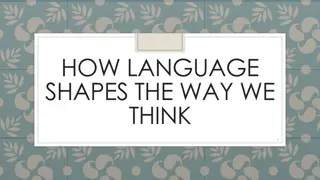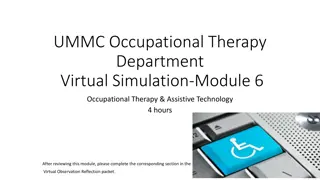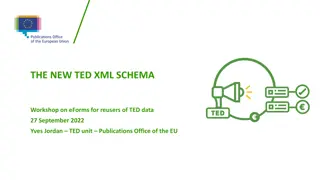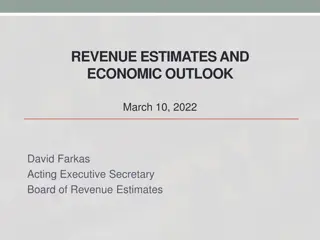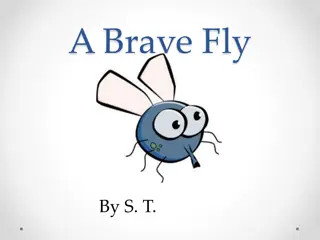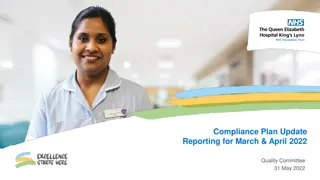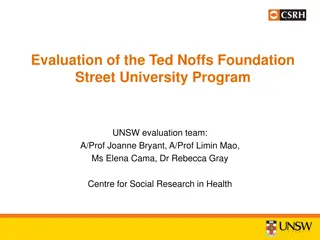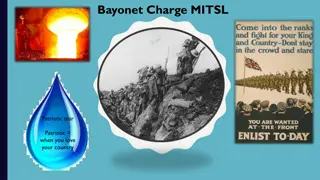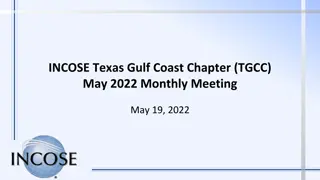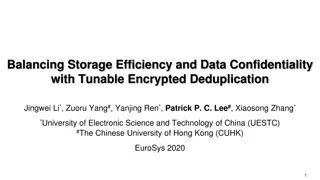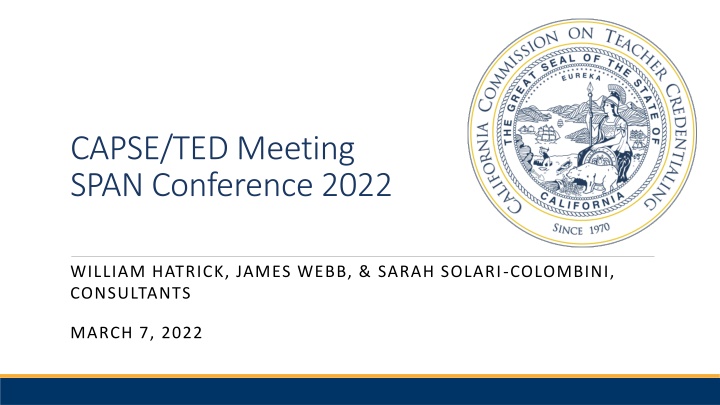
Upcoming Changes in Education Specialist Programs and Credentials
Stay informed about the latest updates in Education Specialist programs- from new requirements to expanded course content and authorization statements. Get ready for the transition to new standards and credential authorizations effective July 1, 2022.
Download Presentation

Please find below an Image/Link to download the presentation.
The content on the website is provided AS IS for your information and personal use only. It may not be sold, licensed, or shared on other websites without obtaining consent from the author. If you encounter any issues during the download, it is possible that the publisher has removed the file from their server.
You are allowed to download the files provided on this website for personal or commercial use, subject to the condition that they are used lawfully. All files are the property of their respective owners.
The content on the website is provided AS IS for your information and personal use only. It may not be sold, licensed, or shared on other websites without obtaining consent from the author.
E N D
Presentation Transcript
CAPSE/TED Meeting SPAN Conference 2022 WILLIAM HATRICK, JAMES WEBB, & SARAH SOLARI-COLOMBINI, CONSULTANTS MARCH 7, 2022
Outcomes Participants will have an understanding of New requirements for Education Specialist programs that take effect July 1, 2022 Clinical practice expectations for traditional, intern, and dual credential candidates New credential authorizations and definitions Dual Credential Programs COVID Flexibilities Education Specialist TPA Updates 2
Preliminary Ed Specialist Programs Transition Timeline February 2022: Approved programs received feedback on Plans for Implementation Spring 2022: Technical assistance from CTC staff based upon Plan for Implementation submissions Spring 2022: Programs continue redesign to meet new standards and TPEs July 1, 2022: Full transition to new standards, TPEs, and Special Education CalTPA (any Commission-approved TPA for Education Specialist candidates) Ongoing- Programs are expected to complete the P s andA s for the Course Matrices in preparation for full implementation and on the accreditation website for full Program Review 3
Expanded Course Content for New Credential Authorizations MMSN and ESN authorizations expanded to include more federal disability categories New Early Childhood Special Education authorization expanded for birth Kindergarten (including TK) and includes Orthopedic Impairment English Learner and Autism authorization preparation remains part of all 5 Preliminary Education Specialist credential programs 4
New Authorization Statements New authorization statements focus on student needs in addition to the disability categories. Federal Disability Category DHH (Current & Future) VI MMD (Current) MMSN (Future) MSD (Current) ESN (Future) ECSE (Current) ECSE (Future) (Current & Future) Autism Deaf-blindness Deafness Developmental Delay Emotional Disturbance Hearing Impairment Intellectual Disability Multiple Disabilities Orthopedic Impairment Other Health Impairment Specific Learning Disability Traumatic Brain Injury Visual impairment, including blindness MMD = Mild/Moderate Disabilities MMSN = Mild to Moderate Support Needs MSD = Moderate/Severe Disabilities ESN = Extensive Support Needs ECSE = Early Childhood Special Education DHH = Deaf and Hard of Hearing VI = Visual Impairments 5
Definitions Definition of Mild to Moderate Support Needs for use in New Authorization Statements: Mild to Moderate Support Needs includes providing specially designed instruction to access grade level California Content Standards in the Least Restrictive Environment. The education specialist provides instruction and supports in one or more of the following domains: academics, communication, gross/fine motor, social-emotional, behavioral, vocational, and learning environment access skills. The supports may also include health, movement and sensory support. Mild to Moderate Support Needs practices may include lower student to educator ratio. Definition of Extensive Support Needs for use in the New Authorization Statements: Extensive Support Needs include providing specially designed instruction to access grade level California Content Standards in the Least Restrictive Environment. The education specialist provides intensive instruction and supports in two or more of the following domains: academics, communication, gross/fine motor, social-emotional, behavioral, vocational and adaptive/daily living skills. The supports also often include health, movement and sensory support. Extensive Support Needs practices include lower student to educator ratio. 6
Education Specialist Standards Effective July 1, 2022 Why is this date important? Transitioning to new standards and TPEs isn t the only thing that needs to happen. Authorization statements need to be put into regulations so that candidates earning the new credentials receive the expanded authorizations that match their preparation. Program sponsors may not fully begin offering the new credential program until July 1, 2022 (the beginning of the approved program s 2022 academic year). 7
Significant Changes to Program Standards 1. Minimum of 600 hours of clinical practice required, including 200 hours of early fieldwork in general and special education settings (Candidate experiences reflect the full diversity of grades/ages, disabilities, and continuum of services outlined in the authorization for traditional and intern candidates) 2. Candidates must take and pass a CTC approved Teaching Performance Assessment 3. Program provides minimum of 10 hours of initial orientation to district- employed supervisors 8
Fieldwork and Clinical Practice for New Credential Authorizations- Interns Reference the Letter to Employers of Education Specialist Interns Clinical practice/field experience changes How Districts and COEs are an integral part of helping interns complete credential requirements TPA information so districts are prepared The 200 hours of supervised early fieldwork in general and special education settings should be completed prior to the intern s last semester of teaching while in the credential program. This can include hours of guided teaching in the intern s own classroom if needed. 9
Dual Credential Candidates General Ed and Ed Specialist: Must meet the program standards language of each credential being earned MMSN and ESN candidates meet the Universal (Gen Ed) TPEs 150 hours of additional fieldwork is recommended depends upon setting inclusive settings are ideal Clinical practice must allow candidates the opportunity to teach students with and without disabilities Length of program for dual candidates what is sufficient? 10
Dual Credential Candidates 2 Ed Specialist credentials (ex. MMSN and ESN, or MMSN and ECSE) Must meet the additional competencies of both credentials (program standards are the same) Candidate needs clinical experience working with students to demonstrate skills and abilities associated with both sets of performance expectations and credential authorizations ESN candidates meet the Universal and MMSN TPEs Programs determine the number of hours required for clinical practice beyond the required 600 hours, if needed 11
Updated Subject Matter Requirements for Preliminary Education Specialists Current subject matter competence requirements have changed, so that any authorized area for the Multiple/Single Subject credentials satisfies the SMC requirement for an Education Specialist. The limitation to core academic areas leftover from NCLB is obsolete. PSA 21-11 12
Health and Technology Education Statutory Requirements CCR 80048.8 Specific Requirements for the Preliminary Ed Specialist Instruction Credential (7) completion of the study of health education, as described in Education Code Section 44259 - Health education, including study of nutrition, cardiopulmonary resuscitation, and the physiological and sociological effects of the abuse of alcohol, narcotics, and drugs and the use of tobacco. Training in cardiopulmonary resuscitation shall also meet the standards established by the American Heart Association or the American Red Cross. (8) completion of the study of computer based technology, including the uses of technology in educational settings, as described in Education Code Section 44259 13
Bridge Authorization for Current Education Specialists October 2020 Commission Meeting Agenda Item 2B - Commissioners approved the following pathways for current ECSE, MMD, and MSD Ed Specialists to earn the equivalent of the new authorization: Coursework, professional development, demonstrated competence Approved program sponsors can choose to offer coursework and/or professional development Program must verify that the teacher has satisfied the requirements addressing the identified TPEs that are needed to earn the bridge authorization This bridge authorization will also need regulatory approval. Current Education Specialists will not be required to earn the bridge authorization 14
Summaries of Recent Commission Actions Commission Action to Extend Specified COVID-19 Flexibilities December 2021 Commission Agenda Item COVID Flexibilities PSA 21-13 15
BSR for Program Entry Suspension of meeting the Basic Skills Requirement prior to entering a teacher preparation program was extended by Commission action (December 2021) until June 30, 2022 if the candidate was unable to complete requirement due to testing center closures related to COVID-19. The Basic Skills Requirement must be completed prior to the issuance of the preliminary credential as the CBEST Deferrals have ended. 16
BSR for Program Entry CBEST has been available through online proctoring option since April 2021. Ensure that prospective candidates know about this option. Online proctoring available 24 hours a day for one week each month. Ensure your institution is implementing the new options for BSR that will exempt some individuals from having to take the CBEST if they meet one of the other criteria for demonstration of basic skills (specific coursework for reading, writing, and mathematics or combination of coursework and examination). 17
SMC Flexibilities for Programs Requirement for subject matter competence prior to whole class instruction in a teacher preparation program suspension extended through the 2021-22 academic year. May also apply to candidates admitted in the spring 2022 for 2022-23 at the program s discretion. Subject matter competence must be met prior to the issuance of the preliminary credential. Eligibility for flexibility only for candidates who were impacted by COVID closures or capacity issues for testing sites. 18
RICA The deferral of the RICA prior to earning the preliminary credential was extended by Commission action (December 2021) until June 30, 2022 due to testing center closures or capacity issues related to COVID-19. Eligibility: Multiple Subject or Education Specialist candidates enrolled in a program on or prior to June 30, 2022, who were unable to complete the RICA due to COVID-19 closures between March 19, 2020, and June 30, 2022. RICA has been available through online proctoring since August 2021 (24 hours/day for one week each month) Ensure that candidates understand the availability of option as it is new Very few candidates should need this deferral. 19
TPAs and APAs The suspension of the TPAs and APAs prior to earning the preliminary credential for those affected by COVID closures during the 2020-21 school year continues until August 31, 2022. The assessments must be passed prior to the recommendation for the clear credential. Conditions are in law and ALL must be present: 1. Candidate was placed or employed at an LEA impacted by school site closures related to COVID-19; 2. Candidate was in the process of completing the TPA/APA at the time of the school; 3. Candidate was unable to complete performance assessment due solely school closures; and 4. Candidate successfully completed all other preliminary credential requirements. Program determine whether the candidate has met all the conditions, not the candidate. 20
TPAs and APAs The vast majority of preliminary candidates should be completing the TPA/APA requirement this year during their preliminary program and not have to use this deferral. The deadline to meet these requirements will be the expiration date on the credential. After August 31, 2022, candidates will need to complete TPAs and APAs prior to recommendation for the preliminary credential. 21
More Information. PSD Special Education Webpage Information for Transitioning to New Standards: course matrices and 2020 webinar on transitioning to new standards and TPEs Transition updates, standards, TPE comparison charts, and additional resources can be found here. Program Office Hours: Monday 10-11am: 2nd and 4th Mondays of each month (beginning Jan. 24th) Click here to join 22
Education Specialist TPA Development & Implementation 23
EdSp CalTPA Development Timeline: MMSN & ESN Fall2016 CTC Forms Preliminary Education Specialist Credential Workgroup Workgroup develops Teaching Performance Expectations (TPEs) for the Preliminary Education Specialist credentials CTC Adopts Revised Education Specialist credential structure October 2016-August 2017 February2018 CTC affirms subject matter requirements, TPEs, program standards, and authorization statements Assessment Cycle and Scoring Rubric Development with Design Team June 2018-April2019 February 2020-June 2022 October 2020-April2021 Pilot Test (Cycle 1 & Cycle 2) October 2021-April2022 MMSN & ESN Field Test May23-27, 2022 MMSN & ESN Standard Setting Study June 16, 2022 Commission Adopts New MMSN & ESN Passing Standard July 1, 2022 MMSN & ESN Operational Administration 24
Cycle 2 Field Test Programs Azusa Pacific University Los Angeles Unified School District Cal Poly Pomona National University California State University, Bakersfield Notre Dame de Namur University California State University, Chico Placer County Office of Education California State University, Dominguez Hills Point Loma Nazarene University California State University, East Bay Riverside County Office of Education California State University, Fresno Sacramento County Office of Education California State University, Fullerton San Diego County Office of Education California State University, Long Beach San Jose State University California State University, Stanislaus Santa Clara County Office of Education Chapman University Teachers College of San Joaquin Claremont Graduate University UMass Global/Brandman University Concordia University University of Redlands Dominican University of California University of San Francisco High Tech High - District Intern Program UC Santa Barbara 25
Field Test Timeline (Cycle 1 & Cycle 2) 13 Jan. 25 Jan. 1-22 Feb. 4 Apr. Cycle 2 orientation webinar, 10:00 a.m.-12:00 p.m. Cycle 2 website/submission system launch (vouchers distributed to programs) Cycle 1 Focus Groups & Surveys Cycle 2 submission deadline Cycle 1 submission deadline Cycle 2 update webinar, 10:00 a.m.-12:00 p.m. Cycle 2 Focus Groups & Surveys Cycle 2 candidate lists due 18 Jan. 31 Jan. 24 Feb. 5-26 Apr. 26
Additional Supports Candidates For system support: Contact Us via field test website http://pilotft.es.pearson.com Programs For technical support: es-spedcaltpa@pearson.com For policy support: spedcaltpa@ctc.ca.gov EdSp CalTPA Office Hours Fridays at 10:00 a.m. (Zoom Link: https://us02web.zoom.us/j/88234062708) Performance Assessment Digging Deeper Series April 20, 2022 -- 1:00 3:00pm (See announcement in PSD E-News) CTC Online Commission YouTube Channel: https://www.youtube.com/user/CalTeacherCommission CalTPA Playlist: https://bit.ly/CalTPAYT EdSp CalTPA Playlist: https://bit.ly/EdSpCalTPAYT 27
Out-of-State (Generic Program) and Out- of-Country Teachers Level I credential holders with the RSG renewal code must go to an approved program sponsor for a transcript evaluation. These teachers must complete the portion(s) of the Preliminary program that have not previously been completed in the OOS or OOC program. In most cases, these candidates should not need an entirely new program if they have already completed an educator preparation program outside of California including student teaching. Please see Coded Correspondence 18-06 for more information. 28
Additional Resources California CEEDAR High Leverage Practices HLP/TPE Alignment Resource Observation Form to provide Institutions of Higher Education (IHE) with a measure to evaluate the use of HLPs, MTSS and UDL principles being leveraged by credential candidates in clinical practice classrooms. 29
Additional Questions? Subscribe to weekly PSD E-News for latest updates Contact SpecialEducation@ctc.ca.gov for program questions Contact credentials@ctc.ca.gov for certification questions (specific candidate inquiries) 30

